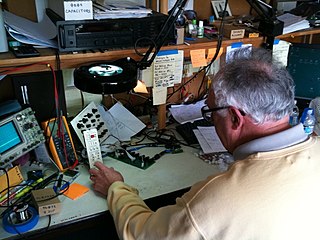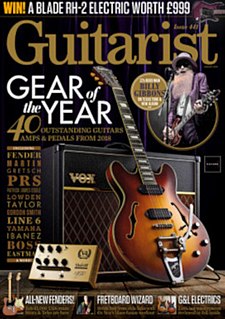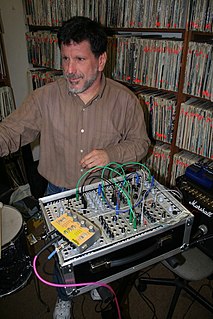
A disc jockey, more commonly abbreviated as DJ, is a person who plays recorded music for an audience. Types of DJs include radio DJs, club DJs, mobile DJs, and turntablists. Originally, the "disc" in "disc jockey" referred to shellac and later vinyl records, but nowadays DJ is used as an all-encompassing term to also describe persons who mix music from other recording media such as cassettes, CDs or digital audio files on a CDJ, controller, or even a laptop. DJs may adopt the title "DJ" in front of their real names, adopted pseudonyms, or stage names.

An electronic musical instrument or electrophone is a musical instrument that produces sound using electronic circuitry. Such an instrument sounds by outputting an electrical, electronic or digital audio signal that ultimately is plugged into a power amplifier which drives a loudspeaker, creating the sound heard by the performer and listener.

MIDI is a technical standard that describes a communications protocol, digital interface, and electrical connectors that connect a wide variety of electronic musical instruments, computers, and related audio devices for playing, editing, and recording music. The specification originates in a paper titled Universal Synthesizer Interface, published by Dave Smith and Chet Wood, then of Sequential Circuits, at the October 1981 Audio Engineering Society conference in New York City.

Roland Corporation is a Japanese manufacturer of electronic musical instruments, electronic equipment and software. It was founded by Ikutaro Kakehashi in Osaka on April 18, 1972. In 2005, Roland's headquarters relocated to Hamamatsu in Shizuoka Prefecture. It has factories in Malaysia, Taiwan, Japan, and the USA. As of March 31, 2010, it employed 2,699 people. In 2014, Roland was subject to a management buyout by Roland's CEO Junichi Miki, supported by Taiyo Pacific Partners.

Digital music technology encompasses digital instruments, computers, electronic effects units, software, or digital audio equipment by a performer, composer, sound engineer, DJ, or record producer to produce, perform or record music. The term refers to electronic devices, instruments, computer hardware, and software used in performance, playback, recording, composition, mixing, analysis, and editing of music.

The Roland SH-101 is an analog synthesizer manufactured by the Roland Corporation between 1982 and 1986. Though it was something of a commercial failure during the time of its manufacture, it later became a staple of electronic music in the 1990s, particularly house music.

Behringer is an audio equipment company founded by the Swiss engineer Uli Behringer on 25 January 1989, in Willich, Germany. Behringer was the 14th largest manufacturer of music products in 2007. Behringer is a worldwide, multinational group of companies, with direct marketing presence in ten countries or territories and a sales network in over 130 countries around the world.
Sequential is an American synthesizer company founded in 1974 as Sequential Circuits by Dave Smith. In 1978, Sequential released the Prophet-5, the first programmable polyphonic synthesizer, used by artists including Michael Jackson, Madonna, and John Carpenter. In the 1980s, Sequential was pivotal in the development of MIDI, a technical standard for synchronizing electronic instruments.

A MIDI controller is any hardware or software that generates and transmits Musical Instrument Digital Interface (MIDI) data to MIDI-enabled devices, typically to trigger sounds and control parameters of an electronic music performance. They most often use a musical keyboard to send data about the pitch of notes to play, although a MIDI controller may trigger lighting and other effects. A wind controller has a sensor that converts breath pressure to volume information and lip pressure to control pitch. Controllers for percussion and stringed instruments exist, as well as specialized and experimental devices. Some MIDI controllers are used in association with specific digital audio workstation software. The original MIDI specification has been extended to include a greater range of control features.

Buchla Electronic Musical Instruments (BEMI) was a manufacturer of synthesizers and unique MIDI controllers. The origins of the company could be found in Buchla & Associates, created in 1963 by synthesizer pioneer Don Buchla of Berkeley, California. In 2012 the original company led by Don Buchla was acquired by a group of Australian investors trading as Audio Supermarket Pty. Ltd. The company was renamed Buchla Electronic Musical Instruments as part of the acquisition. In 2018 the assets of BEMI were acquired by a new entity, Buchla U.S.A., and the company continues under new ownership.
Elektron is a Swedish developer and manufacturer of musical instruments founded in 1998, as well as having its headquarters, R&D and production in Gothenburg, Sweden. They produce mainly electronic musical instruments, but have also made effects units and software. Since 2012, there have been branch offices in Los Angeles and in Tokyo.

David J. Smith is an American engineer and musician and founder of the synthesizer company Sequential. Smith was responsible for the first commercial polyphonic and microprocessor-controlled synthesizer, the Prophet-5, and later the multitimbral synthesizer. He is also referred to as the "Father of MIDI" for his role in the development of MIDI, now a standard interface protocol for electronic instruments and recording/pro audio equipment.
Tim Perkis is an experimental musician and writer who works with live electronic and computer sound.

A music store or musical instrument store is a retail business that sells musical instruments and related equipment and accessories. Some music stores provide additional services for a fee, such as music lessons, instrument or equipment rental, or repair services.

Sound on Sound is an independently owned monthly music technology magazine published by SOS Publications Group, based in Cambridge, United Kingdom. The magazine includes product tests of electronic musical performance and recording devices, and interviews with industry professionals. Due to its technical focus, it is predominantly aimed at the professional recording studio market as well as artist project studios and home recording enthusiasts.

Thomas Elroy Oberheim, known as Tom Oberheim, is an American audio engineer and electronics engineer best known for designing effects processors, analog synthesizers, sequencers, and drum machines. He has been the founder of four audio electronics companies, most notably Oberheim Electronics. He was also a key figure in the development and adoption of the MIDI standard. He is also a trained physicist.

Guitarist is a British monthly music making magazine published by Future plc. It is the longest-established European guitar magazine, and is currently the biggest-selling guitar magazine in the UK. The magazine's current editor is Jamie Dickson, who has been in charge since late-2013. Each issue covers three areas: reviews, interview and technique. This may include reviews of newly released guitars, amplifiers and other equipment; interviews with famous and up-and-coming guitar players; and features on the guitar industry, news articles, playing technique with tablature. Guitarist's slogan was previously "The Guitar Player's Bible", before changing in 2012 to "The Guitar Magazine". In the June 2014 edition, Guitarist celebrated its 30th Anniversary.

A synthesizer is an electronic musical instrument that generates audio signals. Synthesizers typically create sounds by generating waveforms, through methods including subtractive synthesis, additive synthesis and frequency modulation synthesis. These sounds may be altered by components such as filters, which cut or boost frequencies; envelopes, which control articulation, or how notes begin and end; and low-frequency oscillators, which modulate parameters such as pitch, volume, or filter characteristics affecting timbre. Synthesizers are typically played with keyboards or controlled by sequencers, software or other instruments, and may be synchronized to other equipment via MIDI.

Metasonix is an audio equipment manufacturer based in Lakeport, California. Founded by Eric Barbour in 1998, it specializes in vacuum tube equipment.

Gino Robair is an American composer, improvisor, drummer, and percussionist. In his own work, he plays prepared/modified percussion, analog synthesizer, ebow and prepared piano, theremin, and bowed objects. Although Gino is often referred to as a jazz musician, he grew up playing both rock and concert music.
















